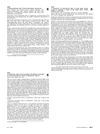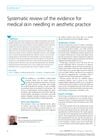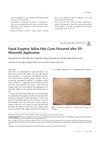 1 citations,
December 2022 in “Biomolecules & therapeutics”
1 citations,
December 2022 in “Biomolecules & therapeutics” Minoxidil may help reduce aging effects in brain cells.
 6 citations,
January 2017 in “Annals of Dermatology”
6 citations,
January 2017 in “Annals of Dermatology” Combination of 17α-estradiol and minoxidil improves hair growth and reduces hair loss in most patients.
 July 2011 in “Springer eBooks”
July 2011 in “Springer eBooks” The document concluded that FDA-approved treatments like minoxidil and finasteride are effective for hair loss, while the effectiveness of natural remedies and other non-approved treatments is not well-supported by evidence.
 15 citations,
October 2003 in “Dermatologic Surgery”
15 citations,
October 2003 in “Dermatologic Surgery” Minoxidil, finasteride, and hair transplantation combined give best results for hair loss.
 November 2003 in “Dermatologic Surgery”
November 2003 in “Dermatologic Surgery” Minoxidil, finasteride, and hair transplantation combined give best results for hair loss.
 January 2025 in “Frontiers in Genetics”
January 2025 in “Frontiers in Genetics” Combining minoxidil and plant extracts improved hair growth in a boy with a rare genetic disorder.
 June 2017 in “Journal of The American Academy of Dermatology”
June 2017 in “Journal of The American Academy of Dermatology” Microneedling with PRP and minoxidil (5%) improves hair growth more than minoxidil (5%) alone.
 August 2018 in “Journal of The American Academy of Dermatology”
August 2018 in “Journal of The American Academy of Dermatology” Different treatments for skin conditions were found to be effective and generally safe, with biologics recommended as the first choice for generalized pustular psoriasis.
 24 citations,
May 2013 in “Drug Design Development and Therapy”
24 citations,
May 2013 in “Drug Design Development and Therapy” Multimodal minoxidil microemulsion is more effective in treating hair loss than minoxidil alone.
1 citations,
April 2022 in “JAAD case reports” A woman developed a rare scalp condition after starting minoxidil, which was resolved with specific shampoo and solution.
 1 citations,
August 2018 in “Journal of The American Academy of Dermatology”
1 citations,
August 2018 in “Journal of The American Academy of Dermatology” Dutasteride and minoxidil mesotherapy effectively treats hair loss with minimal side effects.
 1 citations,
August 2018 in “Journal of The American Academy of Dermatology”
1 citations,
August 2018 in “Journal of The American Academy of Dermatology” Combination of minoxidil and finasteride is more effective in increasing hair diameter than minoxidil alone for female-pattern hair loss.
 February 2017 in “Journal of Aesthetic Nursing”
February 2017 in “Journal of Aesthetic Nursing” Skin needling is a safe, effective, and affordable treatment for various skin issues and enhances other aesthetic procedures.
 3 citations,
January 2018 in “Annals of Dermatology”
3 citations,
January 2018 in “Annals of Dermatology” A woman developed facial hair cysts after using a 3% minoxidil solution for hair loss, which disappeared after stopping the treatment and removing the cysts surgically.
 34 citations,
October 1994 in “Journal of Pharmaceutical Sciences”
34 citations,
October 1994 in “Journal of Pharmaceutical Sciences” Ethanol over 50% helps minoxidil absorb better into skin.
 March 2024 in “International Journal of Pharmaceutics”
March 2024 in “International Journal of Pharmaceutics” Ginsenoside Rg3 combined with minoxidil was more effective in treating hair loss in mice.

Essential oils in a nanoemulsion help hair grow better than minoxidil 2% in mice.

Cetosomal minoxidil is safer and as effective as alcohol-based minoxidil for male hair loss treatment.
 3 citations,
August 2022 in “JAAD case reports”
3 citations,
August 2022 in “JAAD case reports” A woman developed swelling in her body after taking low-dose oral minoxidil for hair loss, but it resolved after stopping the medication.
 1 citations,
April 2022 in “JAAD case reports”
1 citations,
April 2022 in “JAAD case reports” Oral minoxidil helped significantly regrow hair in a patient with traction alopecia.
 25 citations,
January 2010 in “International Journal of Trichology”
25 citations,
January 2010 in “International Journal of Trichology” Mesotherapy for hair loss lacks evidence of effectiveness and safety and should not be used without further scientific support.
 5 citations,
April 2021 in “Frontiers in Pharmacology”
5 citations,
April 2021 in “Frontiers in Pharmacology” Using minoxidil-coated microbubbles with ultrasound significantly boosts hair growth.
 August 2024 in “Scholars Journal of Applied Medical Sciences”
August 2024 in “Scholars Journal of Applied Medical Sciences” Combining PRP therapy with minoxidil is the most effective treatment for hair loss in men.
 2 citations,
October 2020 in “Dermatologic Therapy”
2 citations,
October 2020 in “Dermatologic Therapy” Herbal solution improves hair diameter and density more than 5% minoxidil for androgenetic alopecia.
 22 citations,
March 2020 in “Cosmetics”
22 citations,
March 2020 in “Cosmetics” Nanotechnology improves minoxidil treatment for hair loss.
 4 citations,
May 2020 in “International Journal of Women's Dermatology”
4 citations,
May 2020 in “International Journal of Women's Dermatology” Cow placenta lotion works like minoxidil 2% for female hair loss, with fewer side effects.
![Minoxidil and Its Use in Hair Disorders: A Review [Corrigendum]](/images/research/d5b5fb1b-96a4-4e61-a554-3fe9a1f78497/small/11472.jpg) 1 citations,
February 2020 in “Drug Design Development and Therapy”
1 citations,
February 2020 in “Drug Design Development and Therapy” Low-dose Minoxidil combined with Spironolactone helps reduce hair loss and improve hair density in women, with some mild side effects.
 254 citations,
September 2014 in “Menopause”
254 citations,
September 2014 in “Menopause” The NAMS 2014 recommendations guide healthcare providers on treating health issues in midlife women, emphasizing individualized care and informed decision-making.
 January 2025 in “International Journal of Nanomedicine”
January 2025 in “International Journal of Nanomedicine” Rosemary-based gel with metformin may effectively treat hair loss like minoxidil.
 June 2024 in “British Journal of Dermatology”
June 2024 in “British Journal of Dermatology” Misinformation about alopecia is common online and can harm patient choices.


























![Minoxidil and Its Use in Hair Disorders: A Review [Corrigendum]](/images/research/d5b5fb1b-96a4-4e61-a554-3fe9a1f78497/small/11472.jpg)


